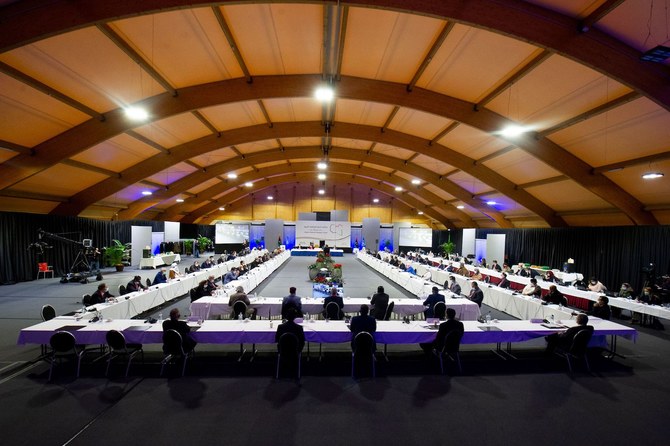
- ARAB NEWS
- 13 Jul 2025

Libya has begun a new phase of its post-Qaddafi transition with the selection of a transitional unity government led by Abdul Hamid Dbeibah, a wealthy 61-year-old businessman from Misrata, as interim prime minister. In addition, Mohammad Younes Menfi from eastern Libya will head a three-person presidential council, which also includes MoussaAl-Koni from the Touareg minority in the south of the country, and Abdallah Hussein Al-Lafi from the western city of Zuwara.
While this appears to be a major step forward in bringing stability to a country torn apart by a vicious civil war, that may not be quite so easy.
First, the selection of those four men by a forum of 75 Libyan delegates at talks in Switzerland was by wafer-thin margins, and was part of a UN-run process rather than the result of reconciliation. Second, Libya remains unstable and different global powers continue to support opposing factions. Finally, the council has only 21 days in which to form a transitional government of national accord in a country where two heavily armed sides, the eastern government under Khalifa Haftar and the Government of National Accord under Fayez Al-Sarraj, still face off against each other in a tenuous cease-fire.
In order to understand the situation, we need to go back to 2011, when long-time ruler Muammar Qaddafi was deposed by NATO-backed forces. Ever since then, this vast and tribal country, which has Africa’s largest oil reserves, has descended into chaos and civil war without a day of peace or quiet.
Tribes, and religious and military factions, have all fought for dominance. Barack Obama admitted in 2016 that neglecting to prepare Libya for what happened after Qaddafi was overthrown was the “worst failure” of his presidency.
While that may be so, the people paying the price are everyday Libyans. According to the UN refugee agency, 1.3 million people are in need of humanitarian assistance, more than 200,000 are internally displaced and over 43,000 have been registered as asylum seekers. These are the official numbers only. All the refugees are eager to cross the Mediterranean to Europe, putting pressure on the EU. That is a lot of human suffering, which comes on the back of a geopolitical dance by world powers.
Haftar is supported by Russia, Egypt, the UAE, Jordan and France, while Al-Sarraj has the backing of the UN, Italy, Turkey, Qatar and several Western countries. Russia and Turkey sent mercenaries, and many others sent weapons.
While everybody is hoping that the cease-fire will last, and that the transitional unity administration will be able to prepare Libya for a successful presidential election at the end of the year, many obstacles stand in the way.
Cornelia Meyer
Since October last year there has been a tenuous UN-brokered cease-fire in place. It led to Libya reopening its oil taps, which was good for the country and posed a challenge to the strict output regime introduced by OPEC+, the oil producers’ alliance led by Saudi Arabia and Russia, which was necessary to rebalance oil markets during the coronavirus crisis. In light of Libya’s difficult internal situation, OPEC exempted the country from its production cuts.
While everybody is hoping that the cease-fire will last, and that the transitional unity administration will be able to prepare Libya for a successful presidential election at the end of the year, many obstacles stand in the way.
First, Haftar and Al-Sarraj will need to cede power, which may prove particularly difficult for the former, who values his reputation as a military strongman.
Second, tribal and sectarian conflicts may flare up again at any time. Few can forget Daesh’s foray into Sirte in 2016, and the terrorists carried out up to 100 attacks in Tripoli and elsewhere as recently as 2018 and 2019. Daesh may have retreated to neighboring Mali, Niger or Burkina Faso, but neither they nor other extremist groups are out of the fray and we can expect them to exploit every domestic weakness in Libya that they can.
Foreign powers may exercise restraint for the time being. The rapprochement between Qatar and other Gulf states is a good sign, as is the fact that Saudi Arabia and others are holding unofficial conversations with Turkey. Nevertheless, especially for Russia and Turkey, Libya is crucial in terms of demonstrating regional influence.
Europe has every interest in Libya finding internal peace, for several reasons. It is a near neighbor, and the EU is still grappling with the inflow of migrants, many of whom cross the Mediterranean from the Libyan coast. Europe also benefits from Libya’s oil and gas exports. Oil production, in particular, came to a standstill at the height of the Haftar-Sarraj impasse.
The world at large has an interest in calming down the geopolitical tensions in Libya and elsewhere in North Africa. Outside the Gulf states, the greater Middle East region is a powder keg of potential armed conflict. Overlay Libya’s importance as an exporter of hydrocarbons and the origin of streams of refugees and it becomes clear that we all want to see the transitional presidential council and December’s presidential elections succeed. And please let us also not forget the plight of the Libyan people themselves, who deserve a more peaceful and prosperous decade than the one they have just had to endure.
Cornelia Meyer is a Ph.D.-level economist with 30 years of experience in investment banking and industry. She is chairperson and CEO of business consultancy Meyer Resources. Twitter: @MeyerResources